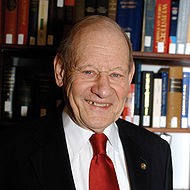Today I was saddened to hear of the death of Paul Kurtz. The American Humanist Association provided an announcement:
Humanists and atheists are mourning the death of humanist Dr. Paul Kurtz, former editor of the American Humanist Association’s Humanist magazine and founder of the Council for Secular Humanism, who died on Oct. 21, 2012 at the age of 86. His death means the loss of one of secular humanism’s most prominent advocates.
The Friendly Atheist presents a good summary of Paul’s many accomplishments, including useful links.
I was honored to have had the chance to get to know Paul over the past few years. We discussed many aspects of his work over the phone. In some significant ways, though, these last few years were not happy times for Paul, given his break from the Center For Inquiry. In fact, Paul felt great frustration regarding his differences with CFI, an organization he founded. Here at DI, I presented an extended interview I had with Paul; I also offered CFI the opportunity to respond at length. Many of Paul’s differences with CFI could be summed up with his concern that instead of focusing on articulating principles for living a meaningful life, many atheists had become “fundamentalist atheists,” “embittered atheists,” people who were “bruised” by religion. According to Kurtz, we can disagree with each other, but we must always do so respectfully. 
On more than a few occasions, I blogged about Paul’s work. What most interested me about Paul were his efforts to articulate secular humanist principles for living a good and meaningful life. He set forth these principles in the form of his “Neo-Humanist Statement of Secular Principles,” a document I signed (you can read the Principles here).
Kurtz coined the term eupraxsophy (originally eupraxophy) to refer to “philosophies or lifestances such as secular humanism and Confucianism that do not rely on belief in the transcendent or supernatural.”
As a longtime subscriber to Skeptical Inquirer, I was quite familiar with Paul’s works for decades before I met him. I look back at my attendance at CFI’s national conference held in Buffalo in the early 1980’s as a formative experience for me. I have adopted some of Paul’s outlook and many of his ideas. It is my hope that I, and thousands of others, can continue to carry his torch going forward.


What a beautiful and thought provoking post about a beautiful and thought provoking man. I didn’t agree with him on everything but the way he was treated by the Center for Inquiry and CSICOP was the very opposite of the humanism he worked to build up over many years. He will be sorely missed.